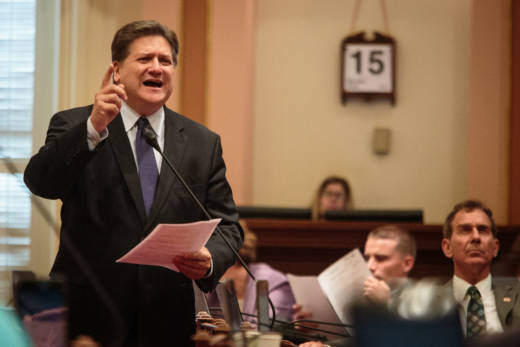Hertzberg said SB 10 would change all that.
The bill still needs to be approved by the Assembly and signed by Brown, but its passage seems likely given legislative leaders’ support. Brown’s office has been intimately involved with the negotiations.
Both Brown and Chief Justice Tani Cantil-Sakauye came out in support of the concept of bail reform last year but asked backers of the change to wait until this year to allow for more time to study the issue.
Under the bill, cash bail — whereby criminal defendants can get out of jail if they pay a set amount of money or pay a bail company to post a bond — will end Oct. 1, 2019, and be replaced by a pretrial release system.
Each county will be charged with coming up with its own pretrial system, which would include a risk assessment tool that considers a number of factors to gauge whether a defendant is low, medium or high risk. SB 10 gives state courts in each county a significant amount of leeway to decide what parameters they should consider when weighing whether to release someone and gives considerable power to individual judges to decide which defendants are suitable for release.
The bill would require that most nonviolent misdemeanor defendants are released from jail within 12 hours. Low-risk offenders would be released on their own recognizance, without any supervision. Medium-risk defendants could be either released or detained, depending on the rules developed by the superior court in each county.
And defendants charged with violent crimes or deemed high risk would be kept in jail until they face trial.
Vesting courts and judges instead of independent pretrial service agencies with that kind of power is at the heart of the ACLU’s decision to remove its support for the bill.
In a statement, ACLU of California lobbyist Natasha Minsker, who has been involved in the negotiations over bail reform, commended Hertzberg for advancing a bill that will “effectively eliminate the exploitative and abusive commercial bail industry that preys on low-income people.”
But, she added, “SB 10 needs to go further to be the model for pretrial justice and racial equity that we are working towards. Any model must include data collection that allows independent analysis to identify racial bias in the system, supports the use of independent pretrial service agencies recognized as the best practice in pretrial justice, and ensures stronger due process protections for all Californians, no matter where they live.”
But other liberal advocacy groups, including the Western Center on Law and Poverty and Californians for Safety and Justice, appeared alongside Hertzberg and Oakland Democratic Assemblyman Rob Bonta, who co-authored the bill, at a press conference to celebrate.
The previously opposed Chief Probation Officers of California said they are happy with the changes and are now in support.
Bonta said the bill strikes a middle ground, and Hertzberg said he plans to introduce future legislation to mandate more data collection.
“Some of you may have heard rumors along the way to the effect that we were watering down,” Bonta said. “I say take another look.”
“From the beginning, we said we were going to reform money bail,” he added, “and with this bill we are actually abolishing it. I would say that is significant fundamental reform.”
Bonta said the bill’s changes would also protect public safety and “make sure nonviolent, low-risk defendants are not unnecessarily locked in jail and those who are truly a safety risk to others are held in custody.”
One group that will not be happy with the bill: The bail industry, which has lobbied hard against any changes and seems likely to challenge SB 10 in court if it becomes law.
